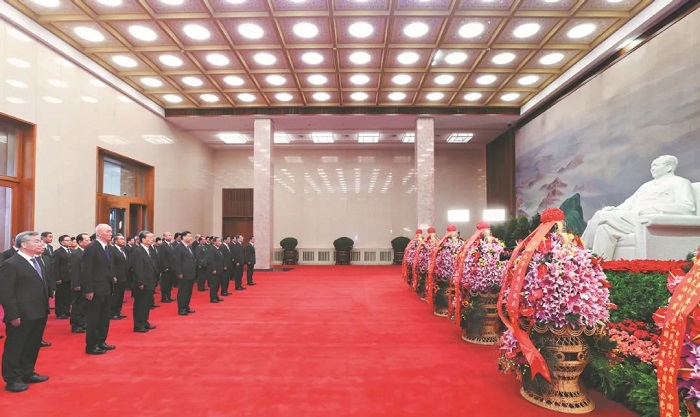
Advance cause pioneered by Mao
2023-12-28 09:00
As the nation commemorates the 130th anniversary of the birth of Chairman Mao Zedong, the Communist Party of China Central Committee held a symposium on Tuesday in Beijing to pay respects to the great man who led the Chinese people to completely change their own destiny and the face of the country.

▲Xi Jinping, general secretary of the Communist Party of China Central Committee, Chinese president and chairman of the Central Military Commission, and other Party and State leaders pay tribute to Comrade Mao Zedong at the Chairman Mao Memorial Hall in Beijing on Tuesday, which was the 130th anniversary of the birth of Mao. JU PENG/XINHUA
Addressing the symposium, Xi Jinping, general secretary of the CPC Central Committee, Chinese president and chairman of the Central Military Commission, called for efforts to push forward the cause pioneered by Mao and advance Chinese modernization to build a stronger country and promote national rejuvenation.
Mao was born on Dec 26, 1893, and passed away on Sept 9, 1976.
Xi reviewed the great practice of Mao's leadership in the Chinese revolution and socialist construction and spoke highly of his outstanding achievements for the Chinese nation and the Chinese people.
Mao Zedong Thought is an invaluable spiritual wealth for the Party and "will guide our action in the long term", Xi said. The best way to commemorate Mao is to continue to advance the cause pioneered by him, he added.
Noting that the central task of the whole Party and the entire nation on the new journey in the new era is to build China into a stronger country and rejuvenate the Chinese nation on all fronts by pursuing Chinese modernization, Xi said it is a cause passed down from veteran revolutionaries, including Mao, and it is the solemn historical responsibility of today's Chinese Communists.
Chinese modernization is a shared pursuit of all the Chinese people, Xi said, and the achievements of Chinese modernization should benefit all the people in a fairer manner.
He stressed the need to improve systems and mechanisms that uphold social fairness and justice, and focus on safeguarding and enhancing the people's well-being.
Noting that reform and opening-up are vital for contemporary China to catch up with the times and the crucial factor determining the success or failure of Chinese modernization, Xi called for further deepening reform and opening-up in an all-around way, continuously liberating and developing productive forces and unleashing and enhancing social vitality.
With a firm determination to reform, the country will resolutely remove all institutional barriers that hinder the progress of Chinese modernization, and inject fresh impetus into all aspects of the modernization drive, he said.
Saying that Chinese modernization is socialist modernization led by the CPC, Xi urged exercising rigorous governance over the Party to advance its self-reform, self-renewal and self-improvement.
He pointed out that Chinese modernization requires the concerted efforts and cooperation of all the Chinese people, and said that the Hong Kong and Macao special administrative regions should be in synergy with the country's overall development, and integrated growth across the Taiwan Strait needs to be intensified.
He reiterated that Chinese modernization is a modernization that follows the path of peaceful development. China's development is adding to world peace, and no matter how far it develops, China will never seek hegemony or engage in expansion, he said.
The symposium was also attended by other Party and State leaders, as well as relatives of Mao, former staff who had worked with him and representatives of his hometown of Shaoshan, Hunan province.
Prior to the symposium, Xi and other leaders of the Party and State visited the Chairman Mao Memorial Hall at Tian'anmen Square. They made three bows toward Mao's seated statue and paid respects to the remains of Mao.
In commemoration of the 130th anniversary, the Central Party Literature Press published a revised edition of selected works of Mao Zedong after the founding of the People's Republic of China (Volumes 1-20) and a chronology of Mao Zedong (Volumes 1-9), which were compiled and revised by the Party History and Literature Research Institute of the CPC Central Committee. The books will be made available nationwide.
China Post issued a series of commemorative stamps on Tuesday to mark the anniversary.
Reporter: Cao Desheng








